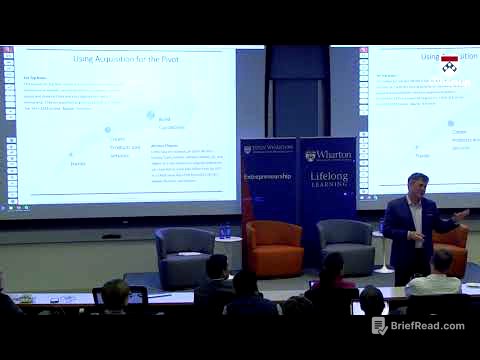TLDR;
This video outlines eight key habits to improve time management and increase productivity. It emphasizes the importance of intentional scheduling, energy management, focusing on meaningful work, minimizing distractions, and aligning actions with personal goals. The habits include:
- Using a calendar effectively for scheduling and time blocking.
- Prioritizing activities that generate energy and positive emotions.
- Focusing on one important task or "adventure" each day.
- Minimizing distractions to improve focus and efficiency.
- Acting quickly on new information and ideas.
- Experimenting with different strategies to find what works best.
- Aligning daily actions with long-term goals.
- Delegating tasks to free up time for more important activities.
Introduction [0:00]
The video introduces the concept of time management as a skill that can be significantly improved by incorporating simple habits into daily life. Time is presented as a non-renewable resource, emphasizing the importance of using it wisely. The video promises to share habits that can make time management feel like having "cheat codes" in a video game, leading to increased efficiency and productivity.
The Calendar Habit [0:29]
The calendar habit is described in three levels. Level one involves scheduling appointments and using the calendar for reminders. Level two involves intentionally scheduling blocks of time for specific activities, treating them as appointments with oneself. This separates planning from execution. Level three involves creating an ideal week in a separate calendar to visualize intentions and bridge the gap between intended and actual activities. The ideal week method involves blocking out time for various activities such as work, gym, meals, and leisure, providing a template for how one wants to spend their time.
The Feel Good Productivity Habit [3:26]
The feel-good productivity habit focuses on making work energizing rather than draining. It addresses the idea that many time management problems are actually energy management problems. Generating positive emotions is key to creating energy. Time management and calendar blocking create the structure, but energy fills that structure with the motivation to complete tasks. The video suggests asking oneself how to make work more energizing by incorporating elements that make tasks enjoyable.
The Adventure Habit [6:13]
The adventure habit involves identifying the most important task for the day and framing it as an "adventure." This mindset helps bring positive emotions to even boring tasks. In addition to the main adventure, the habit includes defining up to three side quests in the areas of work, health, and relationships to ensure balance. This approach supercharges time management and promotes intentionality.
The Focus Habit [8:37]
The focus habit addresses the issue of distractions, which can waste a significant portion of the workday. A study mentioned in the video found that employees waste 22-28% of their day due to task switching and interruptions. Eliminating unwelcome distractions is crucial for improving focus and saving time. The video suggests tuning out distractions by using focus modes on devices and changing environments to minimize interruptions.
The Rapid Action Habit [11:04]
The rapid action habit emphasizes the importance of acting quickly on new information and ideas. The video references a quote by Alex Hormozi, stating that intelligence is how quickly you can change your behavior given new information. Delaying action can lead to forgetting what was learned, so it's important to implement new knowledge or capture it in a to-do list for later action.
The Experimental Habit [12:46]
The experimental habit involves treating different productivity strategies as experiments to find what works best. The video emphasizes the importance of assessing not only the cognitive impact of a strategy but also how it feels emotionally. The goal is to find strategies that feel good, as consistency is more likely with enjoyable activities. The video promotes finding ways to make tasks feel good through experimentation.
The Alignment Habit [15:24]
The alignment habit involves regularly reflecting on one's goals and ensuring that actions are aligned with those goals. This habit includes setting annual goals, reviewing them quarterly, and conducting weekly reviews to ensure alignment with priorities. The weekly review involves revisiting goals, updating to-do lists, and scheduling time to work towards desired outcomes.
The Delegation Habit [17:51]
The delegation habit focuses on identifying tasks that can be delegated to others, freeing up time for more important activities. The video suggests evaluating one's hourly rate and delegating tasks that can be done for less than that rate. Examples include hiring a cleaner or delegating tasks to assistants. The video emphasizes that delegating tasks can save time and allow one to focus on activities that generate energy and align with their strengths.


![Digimon: The Movies | Teaser trailer (Movie Collection 1) [Discotek Media]](https://wm-img.halpindev.com/p-briefread_c-10_b-10/urlb/aHR0cDovL2ltZy55b3V0dWJlLmNvbS92aS9ReGV2NUhEX1pRRS9ocWRlZmF1bHQuanBn.jpg)






